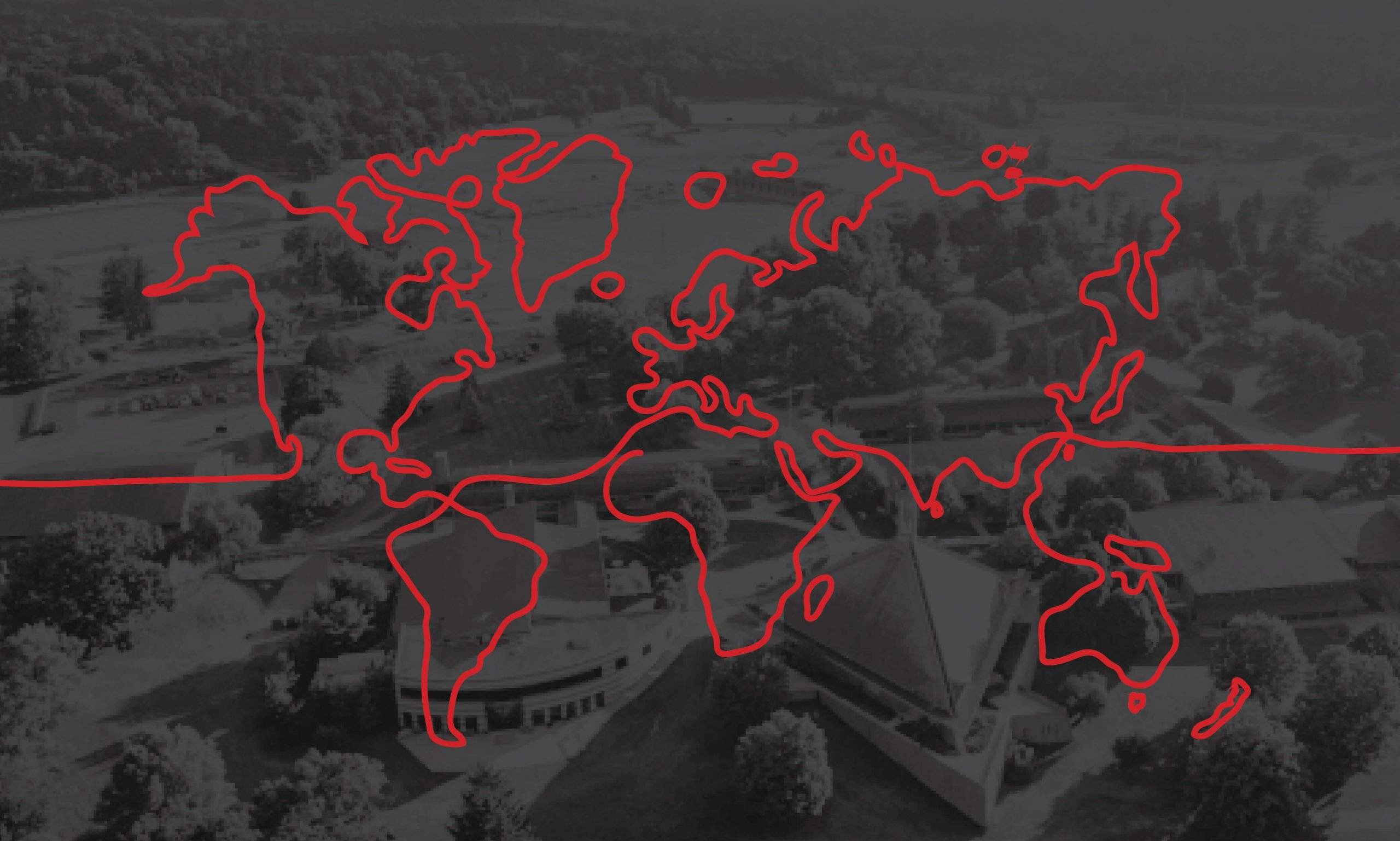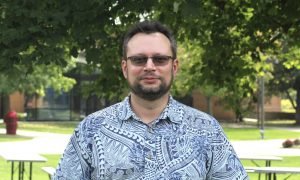
Concordia University Ann Arbor's Quantitative Business Department Chair, Oleg Ivanets, Ph.D., understands the value of international education.
The value of international education
Concordia University Ann Arbor will join many other educational institutions during the week of November 15th-19th, 2021, in celebrating International Education Week.
International Education Week is an initiative that both the U.S. Department of State and the U.S. Department of Education organize in order to highlight the benefits of international education. This effort focuses on preparing U.S. students for a global environment and welcoming future leaders from abroad. International education provides students with many benefits. Professor Oleg Ivanets recently shared his perspective on international education below.
Note: Professor Ivanets’s responses are typed in italics.
Tell us about yourself.

Originally, I’m from Ukraine, and I lived there for about 30 years. I earned my master’s in 2006 in economics and computer science from Shevchenko National University in Kyiv. After that, I worked in industry for quite some time. Then, the global financial crisis happened. I worked in the investments mainly, so everything was in crisis.
At that time, I became interested in long-term policy. I wondered how nobody saw [the economic crisis] coming. How is that possible? I worked some time as an economist for an investment bank, and then I decided to go toward academia to get a deeper sense of policy and those people who formed the policy.
This led me to my Ph.D. program in Hawaii. After living in Hawaii for 8 years, I feel half-Hawaiian. Hawaii has a very different culture, and the way they live is different than many places in the world. After finishing my PhD, I went to a liberal arts college in New Jersey. It’s close to New York City, so it’s a different vibe. When I was there, I met a lot of people who work on Wall Street. I taught in a Wall Street program, and I met a lot of people in this environment. But, living there was exhausting, especially after being in Hawaii. After that, I realized that I wanted to find a more livable, calm place. Since my job was temporary, my contract eventually expired. I was lucky to find Concordia Ann Arbor and have been blessed to move here. I enjoy it a lot.
How has it been living in Ann Arbor?
I really like it so far. As a foreigner, my experience has been strange. Life here is so nice. Housing was much more intense in Hawaii and New York. But, here, I don’t feel like every square foot has to be for something. In Ann Arbor, [because of] the University of Michigan here, there is a lot of diversity, lots of different cultures. The quality of life is good. I’m still learning my role as the Department Chair, so I’ve had a lot of work, but I have been able to meet some people here from Ukraine. There are actually quite a lot; I was surprised. When the Ford factory was operational in the 90s and 2000s, many people from the Soviet Union moved here.
Why do you value international education?
When I teach economics, I try to use other countries as an example. I’ve noticed that many American students don’t know very much about other countries. Analyzing other countries brings a lot of advantages when looking at what works and what doesn’t. [Also,] it forces us to know what’s going on.
Learning from other countries
I’m from other countries, but I’ve [also] learned from other countries. Even professionally, economics and finance are extremely international. You need to know what’s happening in other countries to be successful in your career. If you’re just U.S. centered, you’re missing out on 70% of what’s going on.
Traveling, for students, is very important. Traveling, seeing other countries, especially countries that are successful in some ways, gives students a more global perspective.
When we discuss infrastructure in class, I’ve realized that American students don’t know what infrastructure looks like [outside of the U.S.]. I show them examples of infrastructure from Singapore, who is considered to be the best in the world in this area. Singapore has continued to grow, despite already being seen as the best at this. Students think their infrastructure looks like it’s from another planet or sci-fi. I tell them, “That’s not Star Wars, that’s an actual country that exists on this planet!”
Traveling and studying internationally allows students to look at how the people live in other places. It’s interesting to have a different perspective [and encounter] different people. If you want to succeed in business, you have to understand and learn about different perspectives.
What was it like growing up in Ukraine?
I was seven-years-old when the Soviet Union collapsed, so I only know stories about how it was. I grew up in a free country. Ukraine is not that culturally different from the U.S., but there are some smaller differences. Now that I have friends from other countries like China, Japan, and India, the differences [between Ukraine and those countries] seem greater.
Compared with the United States, life is harder in Ukraine. Ukraine is still figuring some things out, and there is less stability. When I came to the United States, nobody knew what Ukraine was. It’s not Russia. It’s the worst to mix Ukraine and Russia; it’s the worst thing you can do. It’s interesting, because people understand the difference between Ireland and Great Britain. It’s similar between Ukraine and Russia. We’re different! I had to explain this to many people. Now, because there is conflict going on between Ukraine and Russia, people acknowledge the difference. They know it’s not the same now, but they still don’t know much about Ukraine.
The blessing of a strong education
When it comes to my experience in Ukraine, overall, I was lucky. I received a good education in Ukraine. It was really demanding. This is something I try to explain to American colleagues and students. People in the U.S. hear “free education” and they think you can do what you want. It’s a competitive free education. It’s merit-based and has limited spots. They’ll kick you out really fast, too. The better the university, the faster they’ll kick you out [if you’re underperforming]. It’s very strict. We envy American universities because you have [fun in school]. It’s free in terms of money, but it’s a different system. The result for me was that I had a good education. It allowed me to get into the United States and become a professor.
When I was growing up, I remember a time when I went to the U.K. and a trip to London. It was an interesting experience with the English language. My school was good at English, but I had never spoken to a native speaker. In Ukraine, nobody travels. I had upper-intermediate level English, but I was nervous that my English wouldn’t work with real speakers.
A difference of mindset
I like to tell students when we talk about career and what to do that there are only 1 billion people who can really decide what they want to do. The rest are trying to survive. Our mindset is different. We care about having a food and a job. It’s not about what we want to do, but it’s what we have to do to survive. It’s important to recognize that some of the privileges available to the majority of Americans are not available in other places in the same ways. From my experience, when you have something that 98% of the people around you don’t have, it forms the way you think.
You need to know what’s happening in other countries to be successful in your career.
What do you miss about Ukraine?
I miss my friends and family. Sometimes, it’s harder to do regular, everyday things there that I can do in the United States. I forget about this sometimes, but my parents keep reminding me. It’s very dynamic. Ukraine really values its freedom, so you see that expressed throughout the country.
How can American students be more welcoming to their international classmates?
Get to know the students. Understand that their family pressures and structures might be different from yours. For example, Ukraine is similar to the U.S. in some ways, but the family impact and respect for parents is very different. This continues into adulthood as well.
Also, when I was at the University of Hawaii, which is one of the most international universities, I met a lot of people who are from developing countries as well. We can sense that there is a commonality of foreigners from developing countries. In some ways, we’re more risk averse. Things like rollercoasters? Never. It’s not exciting for us to risk our lives. We’re like, “No, we’re good.” We like sitting on the beach doing something relaxing.
When you’re traveling to another country, learn the cultural norms. There might be gender differences you should be aware of. You should be prepared to see that some countries are advanced in some ways, but are lagging behind in others.
Learn more about the value of international education
Does exploring different cultures and learning about life outside of your native country sound appealing? If you’re interested in learning more about global studies at Concordia University Ann Arbor, visit us here.
— Vanessa Lane is the Content Marketing Lead at Concordia University and can be reached at vanessa.lane@cuaa.edu. When she's not at work, she can be found playing with her kids or watching NBA basketball with her husband.
If this story has inspired you, why not explore how you can help further Concordia's mission through giving.